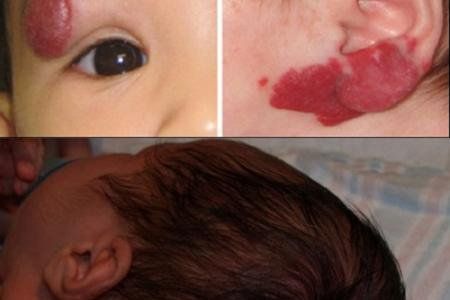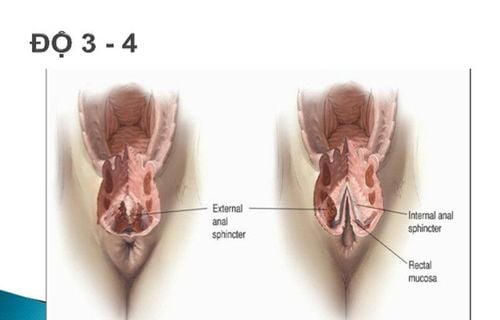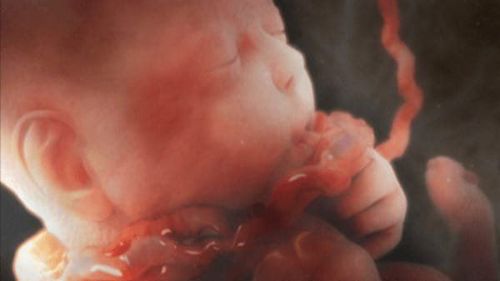This is an automatically translated article.
Posted by Doctor Ngo Van Dan - Neonatologist - Neonatology Department - Vinmec Times City International General Hospital
Neonatal serous tumor is a normal physiological phenomenon. This condition causes swelling or edema in the baby's oily skin, but they are considered harmless and will go away on their own. However, if the serum tumor appears in an abnormal state, affecting health, it is necessary to quickly take the child to a medical center for treatment.
1. What is a serous tumor?
Seroma is a condition in which the newborn's scalp is swollen or edematous, causing a lump or swelling to appear soon after birth, which when touched can make the baby cry in pain. The condition usually improves as the child gets older and is usually harmless except for early and more severe jaundice.
Neonatal serous tumor is formed by subcutaneous serum edema, usually located in the lowest part of the fetal position, between the opening of the cervix (due to the compression of the birth canal, so arterial blood arrives. can, but venous blood cannot return, causing edema). Serous tumors appear only after the rupture of membranes, the larger they are, the longer the labor process is.
It is necessary to distinguish serous tumors from sub-fascial bleeding, which is a state of heavy bleeding between the fascia and skull, often causing severe anemia and shock that needs to be treated early

2. What causes serous tumors in newborns?
Seroma is usually caused by external pressure exerted on the baby's skull surface, causing swelling, bruising, and serous tumor formation. These pressures can come from the vaginal walls and uterus during pregnancy and labor.
Besides, hemangiomas are also often formed due to pressure from the mother's pelvis on the baby's skull during labor or due to the use of birth aids. However, this is different from serous goiter in that the fluid usually forms deeper under the scalp and the fluid composition is mainly blood from broken blood vessels.
Both seroma and hemangioma can be identified during fetal ultrasonography near delivery. These two types of lumps can form when your water breaks too soon. Amniotic fluid is known to support the fetus. The premature rupture of amniotic fluid but the fetus has not come out of the uterus can cause the baby's scalp to collide with the mother's body and become swollen because there is no longer a protective layer.

Possible risk factors for the formation of serous tumours in the newborn include:
Prolonged labor or difficult delivery Premature rupture of membranes Low amount of amniotic fluid in the uterus First birth Braxton contractions -Hicks Abnormal fetal positions, eg head down An ectopic pregnancy is often referred to as a “chignon” and is not a true serous tumor. Chignon disappears faster than normal serous tumours, which disappear from a few hours to a few days after the baby is born.
3. Symptoms of serous tumors in infants
Newborns with serous cysts after birth, parents may see swelling or puffiness on the scalp. The swelling is usually located at the back of the top of the head, because this is where the mother's pelvis and uterus are most exposed (usually the parietal hump). At this time, if touching the tumor will make the child feel pain. Another symptom of serous tumors is bruising on the scalp. In some cases, bruises also appear on the child's face.
During vaginal birth, there is a lot of overlapping pressure on the fetal skull, especially at the top of the skull. This can distort the baby's head, a phenomenon commonly known as fetal head adjustment.

One of the common symptoms after serous tumors is that children often have early jaundice, which increases rapidly due to the dissolution of the serous tumor and bruises if present, leading to increased production of bilirubin (the substance that causes jaundice). Therefore, children need to be closely monitored for jaundice for timely phototherapy to avoid possible dangerous complications.
4. Are serous tumors in babies dangerous?
Usually, serous goiter clears up in a few days to a few weeks without any intervention. Children's families should be careful not to aspirate fluid from a serous tumor with a needle because it can increase the risk of very dangerous sepsis.
Seroma is only dangerous when accompanied by severe complications as follows:
4.1. Jaundice
Serum tumor in the process of dissolution will increase the amount of bilirubin in the baby's blood. Accordingly, tumors often form in children born in the lower tract, babies who go home early in the first day usually do not have jaundice, so families need to pay close attention to this phenomenon for the baby to go to the doctor and get early treatment. Some cases of severe jaundice, especially after a few days after birth, can lead to nuclei of the brain, causing severe sequelae such as deafness, cerebral palsy.

4.2. Brain hemorrhage
If the birth is predicted to be difficult, the doctor often has to support the birth with tools such as Forcep or suction, prolonged labor may cause the baby's head to be heavily impacted on the mother's genital tract. The above factors can cause the baby to have a brain hemorrhage: intracranial or epidural. Therefore, for cases of difficult birth, with serous tumors, it is necessary to closely monitor neurological symptoms such as lethargy, convulsions, irritability... and it is necessary to send the baby for ultrasound or imaging. Computed tomography for definitive diagnosis.
With these cases, parents should take the baby to reputable medical facilities on diagnostic imaging and pediatrics for the most accurate diagnosis. Vinmec International General Hospital is famous for the quality of special pediatric imaging with ultrasound equipment, modern computed tomography CT 640 wide-slice diagnostics, fast speed, 90% reduction radiation dose, safe for babies. With a team of experienced and highly qualified doctors, who regularly participate in international medical seminars, children will have access to the latest and most effective technologies and treatment techniques. .
If you have a need to examine your baby at Vinmec, please register directly at the website right away or contact the hotline system for detailed advice.
Please dial HOTLINE for more information or register for an appointment HERE. Download MyVinmec app to make appointments faster and to manage your bookings easily.














